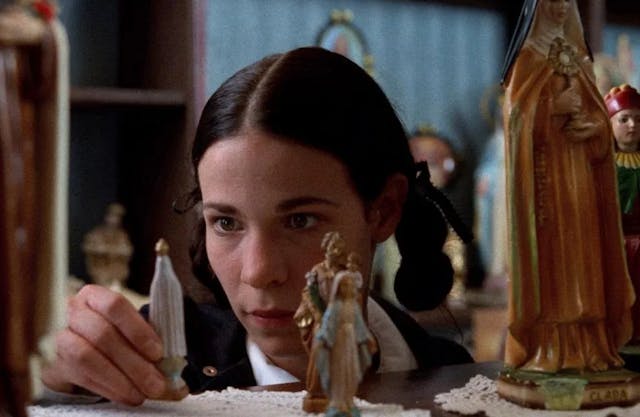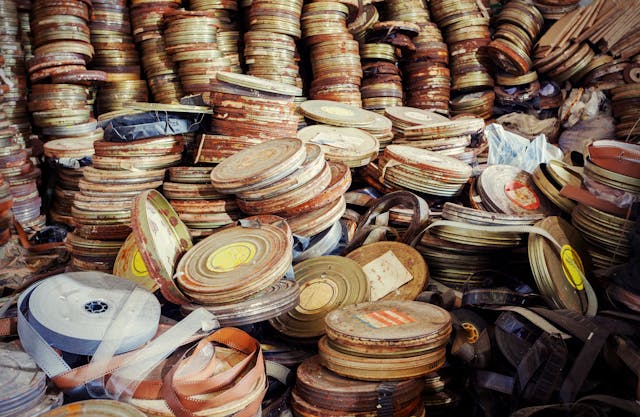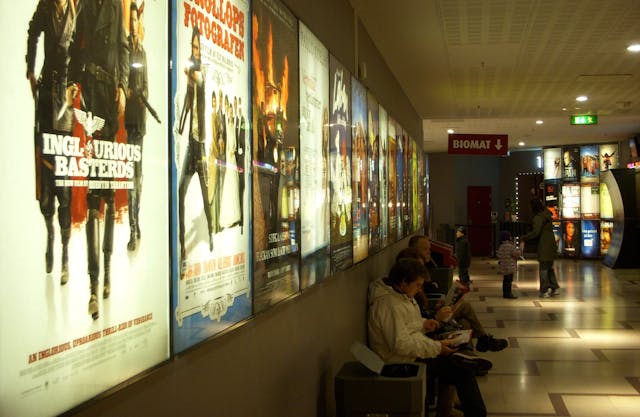Home Video Boutique Labels Will Save Physical Media...and Cinephilia

You should really arrange them vertically, pal!: you can't really have enough DVDs. / Photo by 55hasan, courtesy Dreamstime.
The ubiquitousness of streaming in our lives might give you the impression that the technology has won the home video wars. According to a survey by Forbes, 99% of US households subscribe to one streaming service or more, committing about 21 hours per week to watching them. The phenomenon might resonate worldwide. Perhaps the most popular streamer, Netflix holds more than 260 million subscribers. The scope of its operation helps, but it's not above the geographical controls of copyrights. The content library varies from territory to territory, but those “originals” created in-house are available everywhere. As much as possible, as the pioneer streaming service, Netflix strives for uniformity.
It hasn’t always been like this. When Netflix rented DVDs by mail, the key to its success was adopting the “long tail.” Instead of concentrating on having a few blockbusters that a lot of people watch - as film studios do -have a huge library of titles that, one by one, attract a small audience. If you want to put it in less than charitable terms, success was amassing obtuse crowds instead of catering to the conforming masses.
The supremacy of DVDs as avatars of physical media has been killed and resurrected many times. Every couple of years, a news item invokes apocalyptic images: In 2007, Netflix began streaming! In September 2023, it ceased renting DVDs! In 2024, Best Buy will stop stocking Blu-rays in its stores! Alas, reports of physical media demise have proven wildly exaggerated once and again.

Netflix's iconic red envelopes are gone, but the discs have stayed. / Photo by Karenr, courtesy of Dreamstime.com
If you don’t believe me, let’s check out the numbers. Sales of DVDs have fallen since its heyday, but the format has proven resilient. In 2005, the US market sold $16.3 billion. Since that year, the number has decreased as streaming services have increased. In 2023, sales amounted to $1.56 billion. S ure, Best Buy might be backing off, but I just saw a gigantic bat of DVDs at Walmart, going for $5 each. Yes, DVDs, not Blu-Rays. All of them are high-profile, recent releases: blockbusters, Disney animated movies, the works. So far, in 2024, 50.8% of physical media sales belonged to DVD - standard definition DVD -. Blu-Ray amounts to 31.8%, and Ultra High Definition (UHD) 17.4%.
Sales may be considerably less than in the pre-streaming heyday, but the studios are not abandoning discs. Furthermore, we also have three different formats sharing the pie. It’s unbelievable that more than two decades after high-definition TV entered the home viewing room, the majority of buyers are going for the oldest format, the one that does not take full advantage of the possibilities of their hardware - blame it on the “good enough” mentality that irks TV manufacturers, moping because we don’t change TVs as often as they would like...The big movies still cast a long shadow on the sales charts - Ryan Coogler's “Black Panther: Wakanda Forever” was the best seller of 2023.

Video Queens: Danai Gurira and Angela Bassett reign supreme on the video market with "Black Panther: Wakanda Forever" / Photo by Eli Adé, courtesy of Marvel Studios.
Devotion to physical media is rising as consumers feel burned by the streaming revolution. Paying for a handful of services equals or exceeds the traditional cable bill. Their libraries are both unwieldily and spare at the same time. You can lose a lot of time browsing for something you want to watch, recommendations by algorithm are iffy, and your faves disappear when you want them the most. The concept of having everything, everywhere, all the time just didn’t come to pass. And if you buy a download, it might disappear, too. Bid farewell to your movie…and your money.
Do you know what doesn’t disappear? Those discs are on your shelves. And collecting them is cool once again. On March 12, 2024, actress Carrie Coon visited The Tonight Show, one of many stops in the promotional trek for “Ghostbusters: Frozen Empire” ( Gil Kenan, 2024). During the interview, she confessed she and her husband, Tracy Letts, have a sizeable collection.
Nice shout-out to the amazing gents of DVDBeaver.com, who have been sharing insightful technical reviews of apparently every single DVD release for years. Bluray.com is another source of valuable information.
It is not a surprise if you follow Coon on social media. She often posts the title of whatever movie she is watching and seems to watch at least one daily. The woman who plays stylish turn-of-the-century social climber Bertha Russell in the TV series "The Gilded Age" has impeccably good taste in watching movies at home. Coon and Letts belongs to a small cadre of Hollywood players who love films and share the love anytime they can. The club includes Greta Gerwig, Bill Hader, Natasha Lyonne, and the elder statesman of Cinefilia, Martin Scorsese.
Boutique Labels
The “long tail” is alive and well among boutique home video labels. Don’t let the chic French name scare you away. These are small but devout outlets that track, restore, and release beautiful editions of a wide spectrum of titles, from critically sanctioned classics to disreputable genre pieces. Together, they are a force to be reckoned with.
We reviewed the scourge of lost films while contemplating the miraculous resurrection of “Household Saints” (Nancy Savoca, 1993). Most of the movies put out by these companies would be unavailable, if not lost, were it not for them. They are not really in it for the money. The business is volatile, and the ground is covered with fallen comrades, like the late, lamented Twilight Time.
The keys to boutique labels' success:
The amazing quality of their transfers
Overall, they give the "Casablanca" treatment to even the most marginal title. No amount of effort and resources are spared. They work as if they have a Golden Era Hollywood Classic in their hands, with the mindset of a studio that will milk the transfer for what it’s worth across platforms for the foreseeable future. It doesn’t matter to them that the audience is small. I suspect, at times, the restoration budget may be higher than the movie’s. In this aspect, their main competition is pirated rips circulating on the web.
They make them beautiful
Special editions are carefully designed and built as beautiful objects you want to contemplate and admire. They can be as simple as a nice steel case or as complex as a box full of ancillary products. Although they can get expensive, an alternative edition with just the disc and no frills is sometimes also available.
Focus on niche titles
Forget blockbusters. Boutique labels go for movies that are not on the radar of the major studios. Horror, erotica, B-level action, classic foreign films, and underground niche movies are the preferred genres. Some are film festivals' darlings; some others are midnight screening fare. What they have in common is that you won’t get them anywhere else.
Critical acumen
Extras include printed essays and alternative audio with commentary from scholars and filmmakers, which provide cultural context and/or criteria to reevaluate sometimes maligned films. Some movies look very far from the common conception of "good" cinema. Sturdy criticism can help newcomers decode these movies and understand why they are worthy of consideration. Curatorial savvy allows them to pick and choose titles that serve their audience's interests.
Limited editions
This is kind of sneaky, but I understand where they are coming from. Some make a point of sharing the number of units produced, which makes purchasing more urgent. They even count down the number of units sold, which very often encourages people who are on the fence to push the “buy” button - full disclosure: when I say "people," I mean "me."

Physical media champions: Carrie Coon and Tracy Letts have a 10 thousand discs collection and counting... / Photo © Hutchinsphoto, courtesy of Dreamstime.
Mavericks' Roll Call
We love them all, and certainly, this list does not include them all. So please don’t take it as the last word. We will give you a short profile and recommendations for some of their most enticing products. These are not sponsored links. We do this because we’ll do anything to support physical media.
Arrow Video
Arrow was founded in the UK in 1991. Their fantastic editions were locked for the European region, pushing US-based film fans to purchase region-free players. Transcontinental mail rates and US Importing fees increased the costs. They now have a US-based store besides their original UK web store. Each one has the corresponding titles for their region. They also have Arrow Player, a streaming service available in the UK, Canada, and the US. Their latest crop includes “Blackhat” (Michael Mann, 2014), a reclaimed cursed Hollywood production, blacklist classic “The Day of the Locust” (John Schlessinger, 1974), and a luxurious box set with all the works from Brazilian underground horror filmmaker José Monica Marins, whose “Coffin Joe” movies are notoriously hard to watch. Both by scarcity and because, well, they are scary!
Blue Underground
An American indie, established in 2002, is dedicated to exploitation, cult, and erotica. Not for nothing, they call themselves “Blue.” Recent titles include restored and remastered versions of several movies by Jess Franco, the Spanish master of sexploitation who produced many underground films that appealed to a world audience conditioned by English-language commercial cinema but open to jumping over Hollywood’s hang-ups about sex and violence. Check out the 007 send-up “The Girl from Rio” (1969). It's so disreputable you won’t find it in anybody’s IMDB profile. One of 8 movies (!) the prolific Franco directed in 1969.
Criterion Collection
It may seem unfair to include The Criterion Collection in this list. They are not a scrappy small business but an actual institution with the largest footprint in popular culture. They are canny marketers, turning the unveiling of a cover design into an event - check out the vitriol over their upcoming edition of “Querelle” (Rainer Werner Fassbinder, 1982) - and the PR stunt of shooting artists raiding “the criterion closet” into social media crack.
In a way, they wrote the book on how a film arts-oriented label works. They have been around since the late nineties after all - their first title out was a laserdisc edition of “Citizen Kane” -. And don’t think they are snobs. They had a hit with the zany horror of “Hausu” (Nobuhiko Obayashi, 1977), put out a fancy boxed set with all the Japanese “Godzilla” movies from the Showa Studios era, and introduced American audiences to the early works of Mexican directors Guillermo del Toro and Alfonso Cuarón. They also offer a streaming channel! It’s an embarrassment of riches. By now, they are offering spine number 1223 - Barry Jenkin's epic TV series "The Underground Railroad" (2021), based on Colson Withehead's novel. If you are new to the fold, you can start with their massive box sets for Ingmar Bergman and Federico Fellini.
Flicker Alley
This is a serious-minded label dedicated to hard-to-find and forgotten classics, great films unknown in America, historical curiosities, and restored silents. It feels less commercial than its peers. If Criterion and the others give the vibes of a curious enthusiast, Flicker Alley goes for film professor refinement. Discs can be pricey and rather spare compared to the competition - you will not find fun stickers here -. Still, the quality of restoration and their curatorial instinct is invincible. If money is tight, don’t deprive yourself and rent digital versions of their website. Check out Argentinian noirs from the ‘50s: “Never Open That Door” (Carlos Hugo Christensen, 1952), “The Beast Must Die” (Román Vyñoly Barreto, 1952), “The Black Vampire” (Viñoly Barreto, 1953) and “The Bitter Stems” (Fernando Ayala, 1956) - Carrie Coon and Popflick approved! Their “Julien Duvidier in the 20s” box set is overall excellent, but I have a soft spot for the wild denunciation of capitalism in a monumental department store in “Ladies’ Delight” (1930).
Kino Lorber
Forget Criterion; this is the giant in the neighborhood. This New York-based institution was founded in 1976 by Janus Films to bring international cinema to these shores. In 2009, it merged with Lorber. Their library grew as they made deals with MGM, indies Zeitgeist Films, and Milestone. Just in 2023, they shepherded the theatrical debut of Chilean political thriller “Chile ’76” (Manuela Martelli, 2022), the restoration of the classic “The Conformist” (Bernardo Bertolucci, 1970), and pushed the Tunisian documentary “4 Daughters” (Kaouther Ben Hania, 2023) to an Academy Award nomination. They stream through the Kino Now app and offer the channel Kino Cult. Your best introduction to their four thousand-plus movies library is the recently restored “Household Saints” (Nancy Savoca, 1993).
Severin
Slasher films, Euro-sleaze, creature features, underground freakouts, and overall cult goodness - or badness - …nothing is off-limits for Severin Films. They craft elaborate special editions that push the limits of movie-themed merchandise. One of their most talked about sets of 2023 was “The Sensual World of Black Emmanuelle.” It’s a 21-film collection of soft-core movies starring Laura Gemser as a “pleasure-seeking journalist.” As you can imagine by the title, “Black Emmanuelle” aimed to capitalize on the international hit “Emmanuelle” (Just Jaeckin, 1974), the erotic drama that turned Dutch actress Sylvia Krystel into a global star. The Special Edition with all the trimmings included many goodies inside a period-appropriate ‘70s style travel bag branded “Severin Airlines” - the kind of thing you don't need but can't help to want once you see it. They are the masters of swag but also offer their box sets in no-frills, just-the-movies packages.

Disreputable pleasures: Indonesian model Laura Gemser starred in over 20 movies as "Black Emanuelle," all available in a deluxe boxset from Severin. / Photo courtesy of Severin.
Get their encyclopedic folk-horror compendium “All the Haunts be Ours.” It’s a world-spanning collection of 20 films plus hours of extra material. It includes the nightmarish soviet-era “Viy” (Ershov et al.,1967), the American indie “Eyes of Fire” (Avery Crounse, 1983), and the Serbian hit “Leptirica” (Djordje Kadijevic, 1973) based in a vampire story that predates the publication of Bram Stoker's “Dracula” by a couple of decades. The box comes with witchcraft-themed stickers! I'm very keen on their collections of Italian Gothic movies, where Gialli meets fantasy. Hard-to-find cult titles come into their slate, like Michele Soavi's hard-to-find "Cemetery Man" (1994), part of a batch of movies by the Italian horror master.

Burn, baby, burn!: an overzealous inquisitor victimizes women in the Czech classic "Witchhammer," included in the boxset "All the Haunts Be Ours" / Photo courtesy of Severin.
Vinegar Syndrome
Connecticut-based Vinegar Syndrome takes its name from one of the most common causes of film deterioration. It’s a sly reference to their mission, saving genre films from extinction and making them available again to the public. The founders, film archivists Joe Rubin and Ryan Emerson, started with vintage porn and soft-core erotica and eventually expanded to cult, exploitation, and underground cinema. They were early experimenters with View on Demand (VOD) services but eventually decided to pull the plug and concentrate on physical media. They founded sub-labels Vinegar Syndrome Picture and Cinématograph. Sight unseen, you can buy the Cinématograph restoration of the sex comedy “Little Darlings” (Ron Maxwell, 1980), with Tatum O’Neal and Kristy McNichol as a couple of teens betting on who can lose her virginity first during summer camp. Matt Dillon and Armand Assante (!) are their main targets. The age gap and no-sex-scenes-in-movies contingents, which surely overlap, will have a fit. The movie has never been available on home video until now. Never. No Betamax, no VHS, no Laserdisc, no DVD, nothing. See why these labels are awesome? They are a movie buff's best friend.
Watch “Lonely”
“Lonely” is a powerful reminder that no one is ever truly alone, and there is always someone out there who cares and wants to help.
Stream NowWant to get an email when we publish new content?
Subscribe today




























